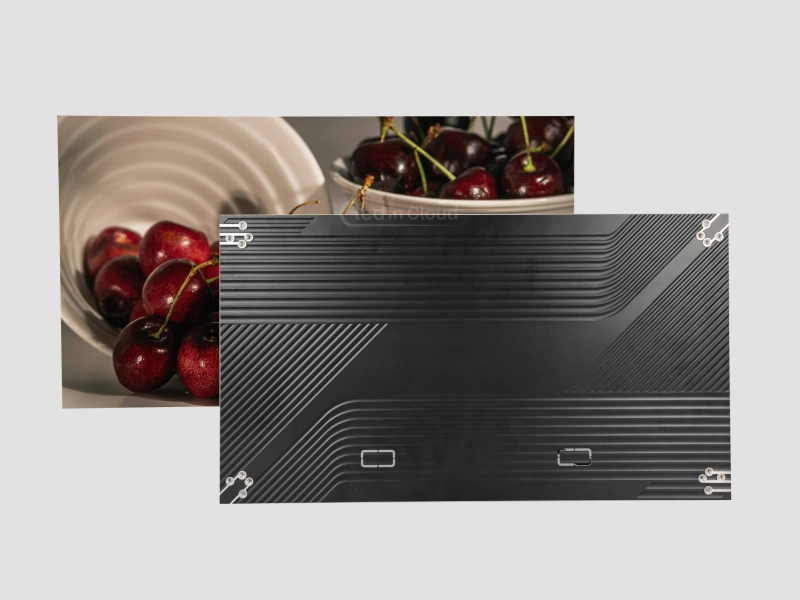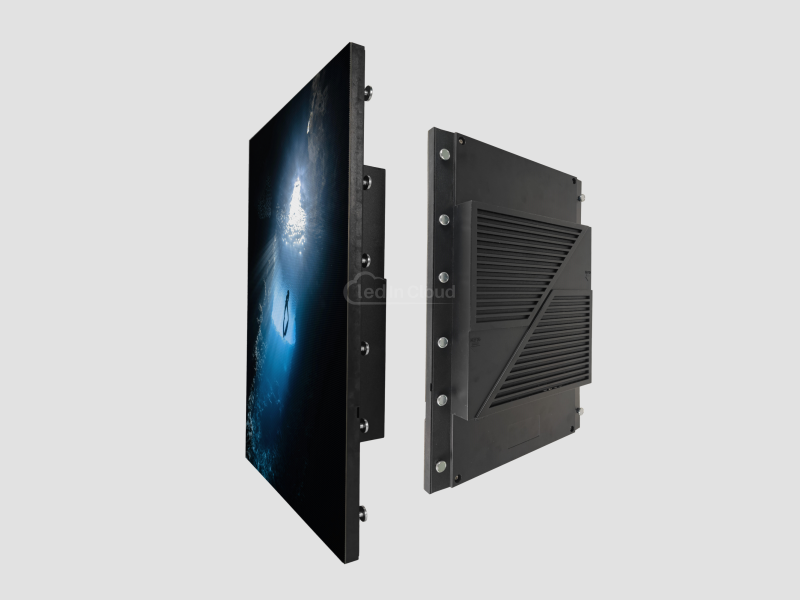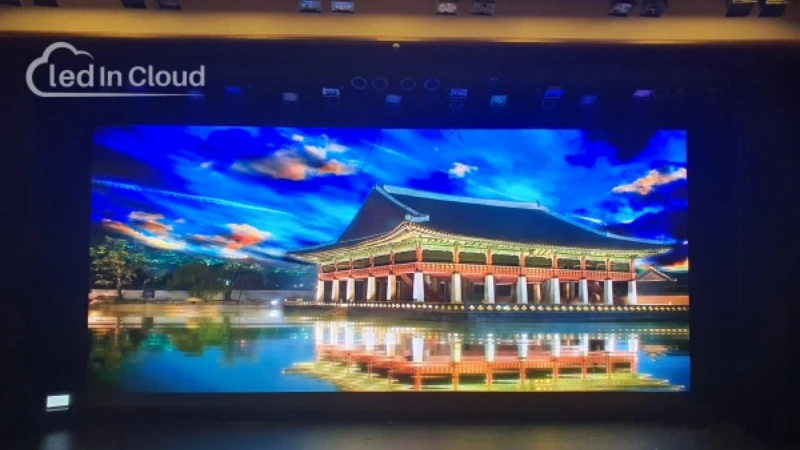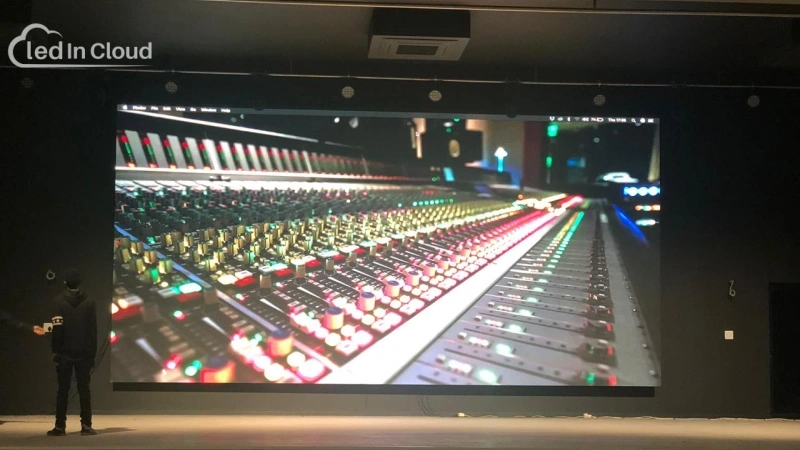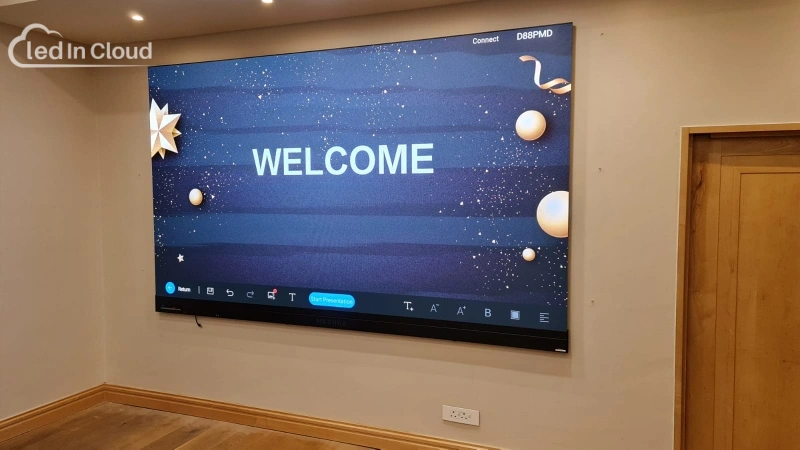
Elevate Worship with a Church LED Wall
From Sunday services to holiday events, a high-quality LED wall for church helps your message reach every corner of the sanctuary—visually clear and emotionally engaging.
Whether you’re leading worship, displaying sermon slides, or hosting weddings, LED video walls offer a flexible and modern solution that replaces outdated projectors.
Church LED Wall Product Recommendations
We’ve selected a few popular products that are especially well-suited for church environments—from small chapels to large sanctuaries.
LED Display Price Calculator
Just fill the sizes, and get your LED screen budget right now !
Why Choose an LED Display Screen for Church?
Let’s face it—churches today need more than just a basic screen. Whether you’re leading worship, sharing scripture, or livestreaming services, your visuals need to keep up. That’s where LED display screens come in. They’re not just a tech upgrade—they’re a better experience for your congregation.
Bright and Clear in Any Light
No more dim projections—LED screens stay vivid even in sunlit rooms.
No Shadows, No Blurring
LED walls don’t rely on front projection, so no one blocks the image.
Supports Lyrics, Scripture, Video
Display multiple layers of content—perfect for dynamic worship and hybrid services.
Perfect for Live Streaming
High refresh rate (1920Hz+) prevents flicker on camera.
Custom LED Wall Solutions for Every Church Size
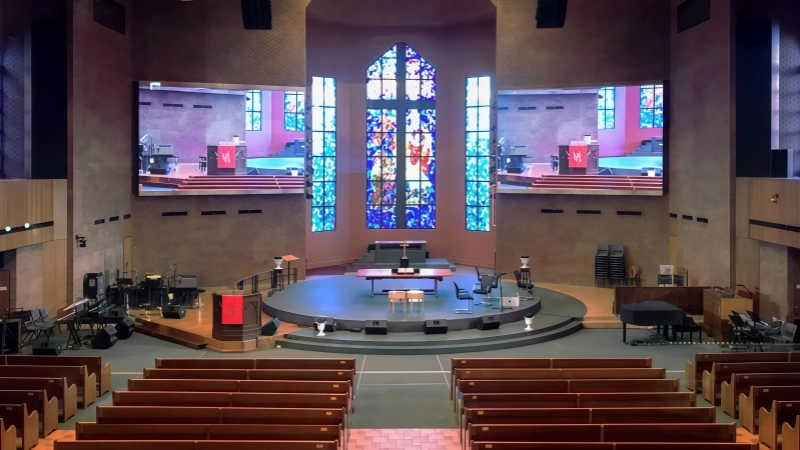
We provide modular LED wall panels for churches, meaning you can build a screen that fits your space—whether it’s a small chapel or a 1000-seat sanctuary.
Most requested configurations:
- 4×2m LED wall for mid-size church stages.
- 6×3m curved LED wall for modern churches.
- Small LED banner displays for entrances or scripture highlights.
Send Us Message
If you have any LED display projects or technical problems regarding our LED display products. Please send us a message, we will reply to you in 24 hours.
ATTENTION: lf you bought LED Display & LED Module from other suppliers, Please get help from them directly.
Church LED Wall Buying Guide: Smart Picks & Real Costs
Over the past decade, church LED wall have quietly transformed sanctuaries around the world.
If your church still uses a projector, you’ve probably noticed a few things. The image looks washed out when the lights are on. Text isn’t always clear unless you’re sitting up front. And when someone walks in front of the screen—everything disappears.
That’s why more churches, big and small, are moving to LED video walls. They’re bright, sharp, and visible from any seat in the room, even with full daylight. But beyond the visuals, LED screens bring a different kind of energy. Lyrics are easier to follow. Sermons feel more focused. And younger members—used to high-quality visuals everywhere—feel more at home.
Still, switching to an LED wall isn’t a small decision. There are questions about cost, screen size, setup, and whether to buy, rent, or lease. This guide breaks it all down—no fluff, just clear answers based on real church needs.
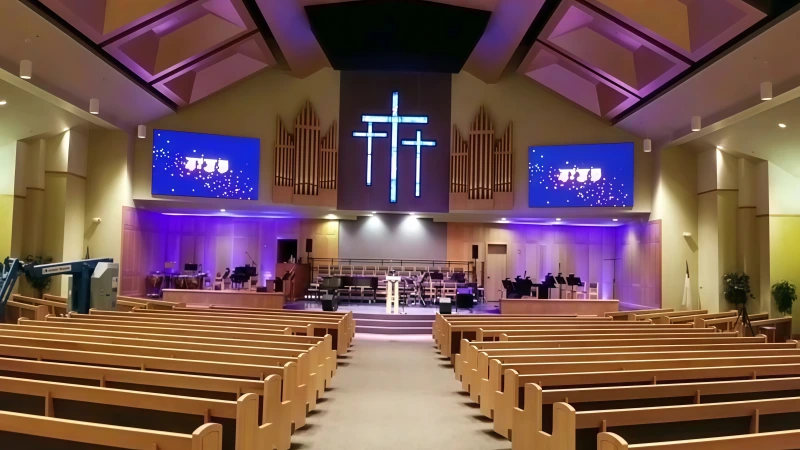
1. Why Church LED Video Wall Beat Projector?
Let’s be honest—projectors just don’t cut it anymore.
In many churches, especially older ones, the lighting can’t be fully controlled. That makes projector images look dim and washed out, especially during daytime services or when the house lights are up. LED video walls don’t have that problem. They stay bright and vivid no matter what the lighting is like.
Clarity is another big win. With a projector, text often looks blurry unless you’re sitting close. An LED wall, even in a mid-size church, delivers crisp, easy-to-read lyrics and sermon notes from every seat. Some people in the back rows—or those with weaker eyesight—struggle to read small text on a blurry projection. A good LED wall fixes that.
Then there’s the issue of shadow interference. You’ve probably seen it—someone walks across the stage and suddenly blocks part of the image. With a church LED screen, there’s no projection path to interrupt. The content is part of the wall, so nothing gets in the way.
Live streaming and photography also matter more than ever. A low refresh rate from a projector can cause flickering on camera. A good LED wall for church runs at high refresh rates (1920Hz or more), which means no flicker, clean video, and better recordings.
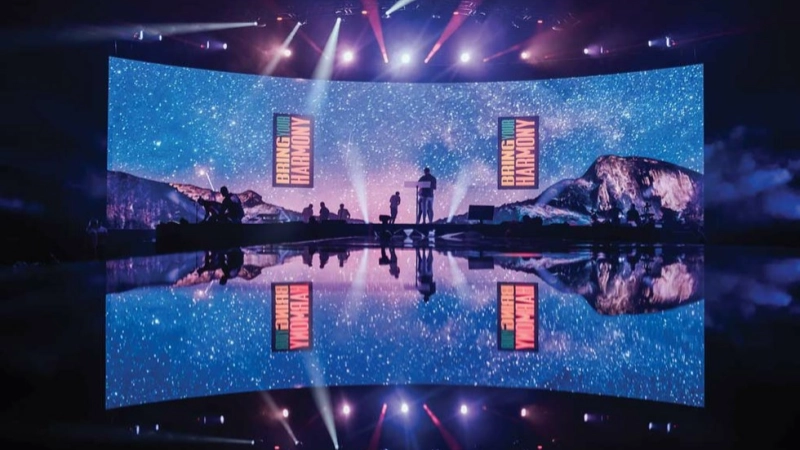
Here’s a quick side-by-side:
| Feature | Projector | Church LED Wall |
| Brightness | Fades in bright rooms | Always bright, even in daylight |
| Image Clarity | Gets blurry at distance | Sharp from every angle |
| Interference | Can be blocked by people | Seamless, no shadows |
| Maintenance | Bulbs burn out | Long lifespan, minimal upkeep |
| Livestream Quality | May flicker on video | Camera-friendly, high refresh rate |
In short, switching to an LED video wall for church isn’t just about looking modern—it solves real, everyday problems that projectors can’t.
2. How Much Is LED Screen for Church?
Let’s talk numbers—because for most churches, budget comes first.
The price of a church LED wall depends on a few things: the size of your space, the screen resolution you want, and whether you’re buying a full package or just the panels. We can break it down for you so you know exactly what it’s going to cost.
2.1 Typical Price Range
For a basic setup in a small to mid-size church, you’re looking at $10,000 to $25,000 USD. That usually includes the LED panels, mounting structure, control system, and basic installation.
Want a larger screen for a big sanctuary? The price goes up—$30,000 to $60,000 or more isn’t unusual for a high-resolution video wall with professional-grade hardware and live streaming capability.
Some churches in regions like Nigeria or Kenya often ask about local pricing. While the hardware cost might be similar, import taxes, shipping, and installation support can affect the total. That’s why when people search “led screen for church price in Nigeria” or “church led screen price in Kenya,” they often see ranges that vary by 20–30% depending on local vendors.
2.2 What's Included in the Cost?
Here’s a quick breakdown of what the price typically covers:
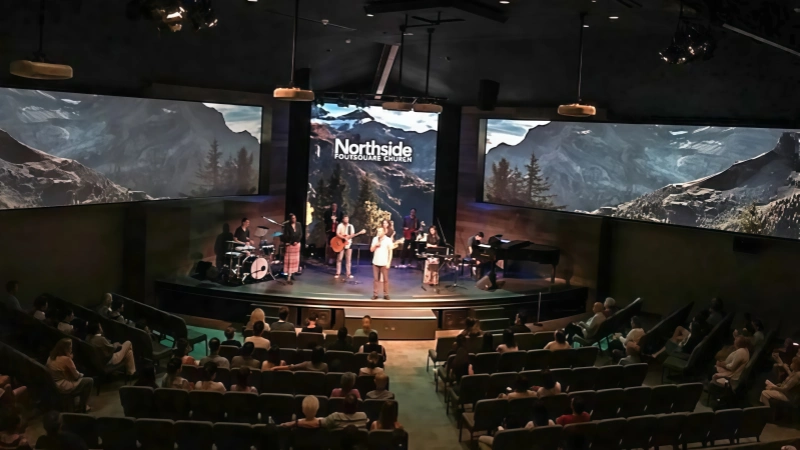
Here’s a quick breakdown of what the price typically covers:
- LED wall panels – This is the screen itself. Pixel pitch affects the cost. The smaller the pitch, the higher the clarity – and the higher the price.
- Video processor/controller – Think of this as the brain. It sends content to the screen.
- Mounting system – Wall brackets, trusses, or ground support, depending on how you’re installing it.
- Control software – Often bundled, but not always.
- Cables and power setup – Don’t overlook this. A messy install can cause big problems later.
- Installation labor – Some churches handle this in-house, others hire pros. Cost varies.
2.3 Hidden or Ongoing Costs
Power consumption – LED walls use more electricity than projectors, but modern systems are energy-efficient. Over time, power bills are manageable.
Maintenance – Most LED panels last 5 – 7 years or more. No bulbs to replace like projectors, but occasional servicing helps.
Training – Someone needs to run it. Some vendors (LedInCloud) offer training, some don’t.
2.4 Can It Be Cheaper?
Yes – register LedInCloud, where you can check prices by yourself. Contact LedInCloud and we will definitely give you the most affordable price and the best quality LED screen.
3. How to Choose Church LED Screen?
Buying an LED wall isn’t just about picking the biggest screen you can afford. Size and pixel pitch need to match your space, your budget, and how people use the room.
3.1 Start with Viewing Distance
A good rule: the farther people sit, the less pixel density you need. The closer they sit, the finer the pixels need to be.
Here’s a simple guide:
- Under 10 feet viewing distance → go for P1.5 to P2.0
- 10–20 feet → P2.5 to P3.0 is usually enough
- Over 20 feet → P3.9 or P4.8 works just fine
So if your church is small and people sit close to the stage, you’ll need a tighter pixel pitch. That costs more, but it avoids blurry text and blocky graphics.
3.2 How Big Should the LED Wall Be?
There’s no perfect size—but there are a few things that help you decide:
- How wide is your stage? A common layout is to cover about 60–80% of the stage width.
- How many people are in the room? The larger the congregation, the bigger the screen should be so everyone can see clearly.
- Are you replacing a projector screen? If yes, you’ll want an LED wall that’s at least the same width, ideally bigger.
As a quick example:
A 4m x 2.5m (about 13ft x 8ft) LED wall with P2.5 is perfect for mid-size sanctuaries with 150–300 people.
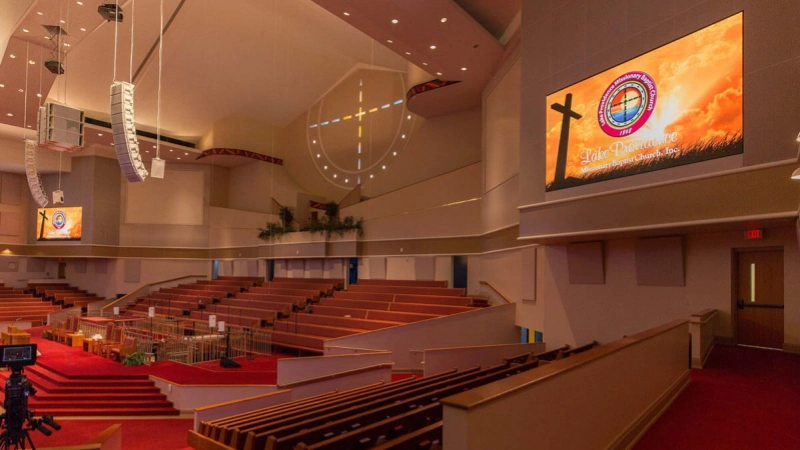
3.3 Custom Shapes or Curved Walls?
Modern churches sometimes use curved LED walls or split screens for creative layouts. If you’re going for a modern worship vibe or plan to use motion graphics, this can really elevate the space.
4. Creative Church LED Wall Design
LED walls can do a lot more than just show words or videos. They change how your whole stage looks and feels.
(1) Change the Mood Quickly
Want a peaceful sunrise picture for morning prayers? Or bright, moving colors for lively songs? LED walls make it easy to switch scenes and create the right feeling.
(2) Show More Than One Thing
You can put different things on the screen at the same time. Like song lyrics in the middle, a live video of the pastor on one side, and Bible verses on the other. This helps everyone follow along.
(3) Custom Backgrounds
Instead of boring backdrops, you can use pictures and designs that match your church’s message. For Easter, Christmas, or special events, the screen can show something new.
(4) Different Shapes and Sizes
LED panels can be put together in many ways. You can have a big flat screen behind the stage, or wrap it around the sides. Some churches even put LED panels on the floor or walls.
(5) Simple Tips
Talk with LedInCloud – a global leading LED Screen Cloud Platform about what fits your church and budget.
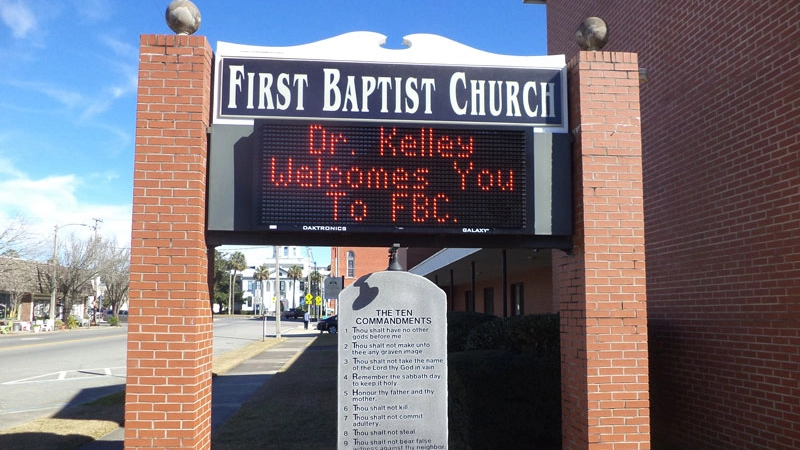
5. Installation Church LED Display Without Headaches
Worried about how to actually set up an LED wall in your church? The good news is—it’s not as scary as it sounds, especially if you plan it right and work with the right people.
5.1 You Don’t Have to Do It All Yourself
Most LED screen suppliers offer full installation services. That means they’ll handle the heavy stuff—mounting the panels, wiring, setting up the control system, and even testing it live. If you’ve got a tech team, they can join in and learn during the process.
If you’re working with LedInCloud, they offer clear, step-by-step installation and maintenance guidance—even remote support if needed.
5.2 Know Your Space First
Before anything gets delivered, take a good look at your stage area.
- Do you want the screen hung on the wall, or mounted on a stand?
- Is there enough power available nearby?
- Can your stage support the weight if it’s a big screen?
These questions help avoid surprises on installation day.
5.3 Don’t Forget About Control
Every LED wall needs a brain—usually a video processor or controller box. That part connects to your laptop, camera system, or streaming setup. It sounds techy, but once it’s set up, switching visuals is usually as simple as clicking a button.
5.4 Cable Chaos? Nope.
A lot of people worry about messy cables. But with LED wall panels, the power and data cables usually daisy-chain together—less clutter, less stress. A clean setup is totally doable.
5.5 Keep It Accessible
One smart tip: don’t install the wall so high or deep that you can’t reach the back. You’ll want to access the panels later for updates or basic maintenance. Save yourself future trouble.
6. How LED Screens Changed Churches Worship Experience
Let’s face it—church doesn’t look like it did 20 years ago. LED screens have played a huge role in making worship more engaging, more accessible, and honestly, more alive.
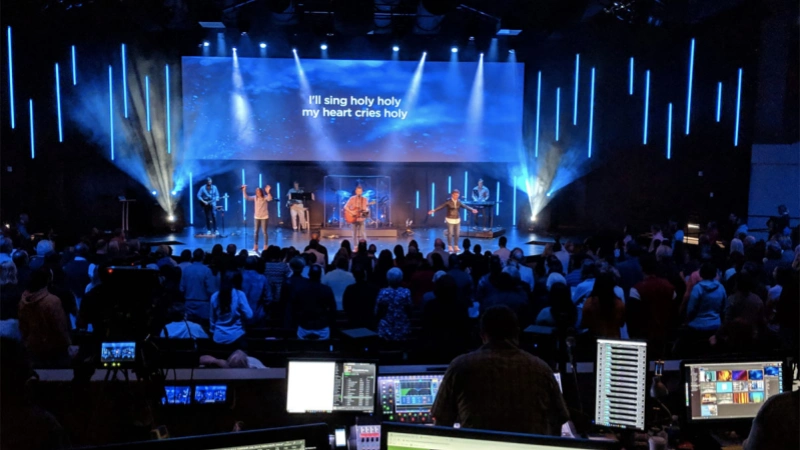
(1) Everyone Can Follow Along
Whether it’s lyrics, scripture, or announcements, having it up on a bright, clear LED screen means no one’s left out. People in the back rows? Seniors with weaker eyesight? No problem. The message is visible to everyone.
You can even show multiple things at once—text on one side, background video in the center, and maybe even live sign language interpretation in a corner. LED video walls make that easy.
(2) A More Immersive Atmosphere
Visuals matter. When the message on stage is backed by dynamic, high-quality visuals, the whole room feels different. Think moving backgrounds during worship songs, or visual themes that match the sermon. It’s not about being flashy—it’s about drawing people in and helping them connect.
(3) More Connection, Less Distraction
Old projectors flicker. Bad angles make it hard to see. Faded text gets ignored. LED walls solve all of that. They create a smoother, more professional experience that lets people stay focused on what matters: the worship itself.
(4) Speaking to the Next Generation
Younger members are used to high-res screens everywhere—in school, at work, even in their pockets. When your church uses an LED wall, it sends a message: We’re growing, we’re active, and we’re not stuck in the past. That matters, especially when trying to reach new or younger attendees.
(5) Support for Special Moments
Baptisms, choir performances, guest speakers, community announcements—you name it. A good LED wall adds a visual layer to those moments. It helps tell the story better and makes big days feel even more meaningful.
7. FAQs
A brilliant stage LED screen isn’t just about the visuals—it’s also about how well it’s installed and maintained. Even the most advanced display can fail to impress if it flickers, overheats, or isn’t positioned correctly.
What’s the best pixel pitch for a church LED wall?
It depends on how close your audience sits.
- For small to mid-sized sanctuaries (viewing distance 10–20 feet), go with P2.5 or smaller.
- For larger spaces, P3 or P4 usually works fine.
Closer seats need tighter pixel spacing to keep text and video sharp.
How bright does the screen need to be?
For churches indoor LED screen, 800–1200 nits is usually enough.
If you have windows or skylights bringing in sunlight, aim for 1,500 nits or more to keep everything clear and readable—even during daytime services.
Can we use our existing AV system?
Usually yes, especially if your current setup already uses HDMI or SDI. Most modern LED controllers (like NovaStar or Huidu) work well with existing switchers or laptops. If you’re unsure, a supplier like LedInCloud can help you match the right components.
What about maintenance and reliability?
Good-quality LED panels are built to last 5–7 years or more.
Should we buy, rent, or lease?
Buy if you want full control and use it weekly.
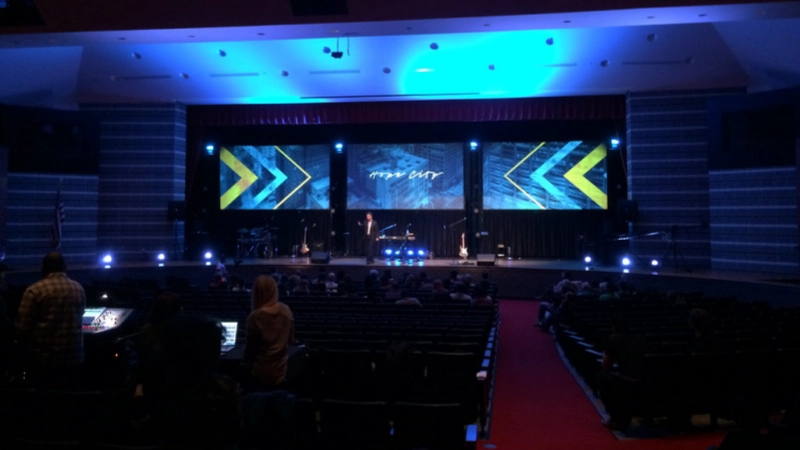
8. Conclusion: LED Walls Are No Longer a Luxury for Churches
Today, you can get a bright, reliable, easy-to-use LED display that fits your space, your worship style, and even your budget. Whether you’re running a small community church or managing production for a large sanctuary, there’s a solution out there that works.
More importantly, an LED wall isn’t just a “cool upgrade.” It’s a tool to help your message reach people—clearly, visually, and memorably.
And with better prices, smarter designs, and support from teams like LedInCloud, getting one installed is way easier than you’d think.
More Products
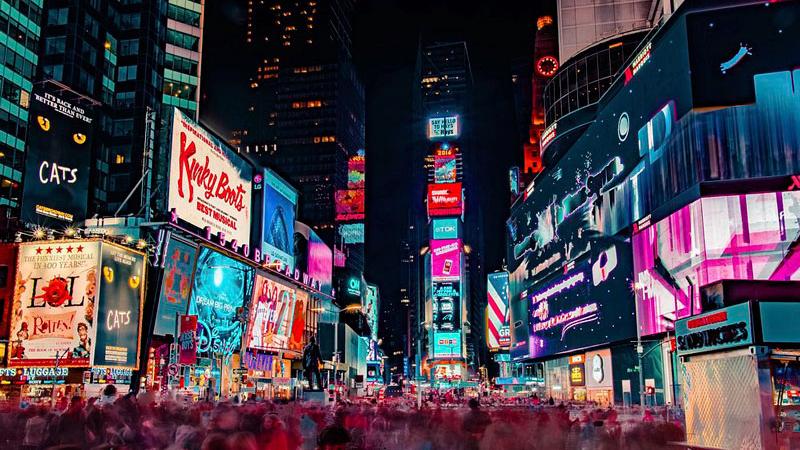
Outdoor LED Screen
Outdoor series featuring high protection, brightness, and easy installation.
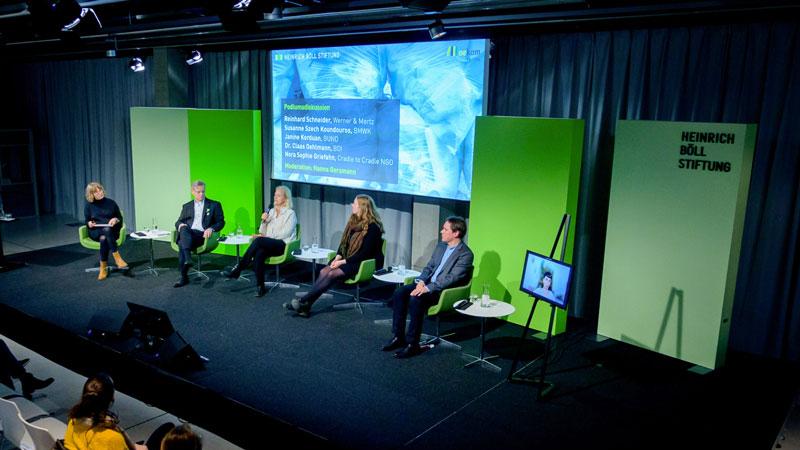
Indoor LED Screen
The high-definition LED screen delivers vibrant and clear visual performance.
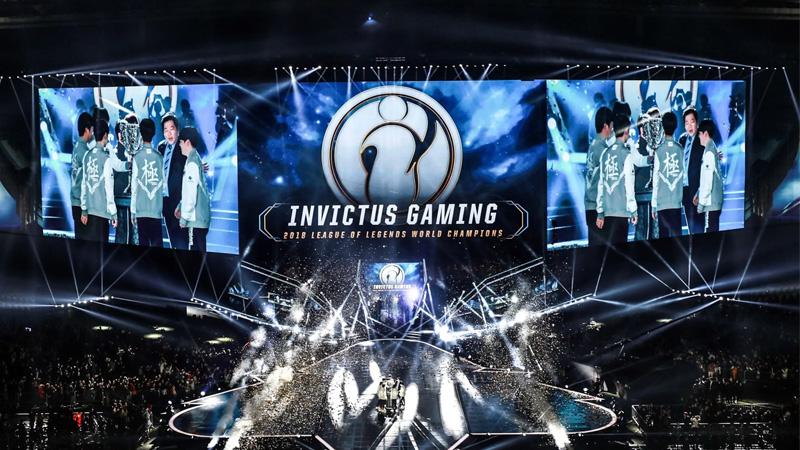
Rental LED Screen
Easy installation and maintenance, with excellent visual performance.
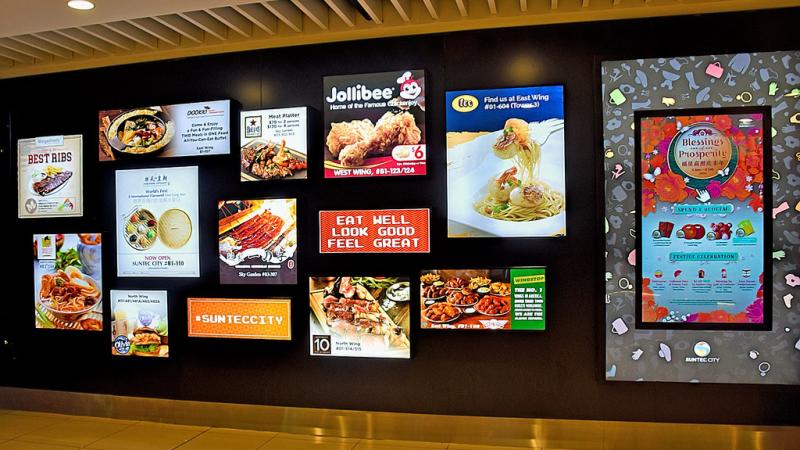
Commercial LED Screen
Various types of LED screens to enhance benefits for commercial venues.


